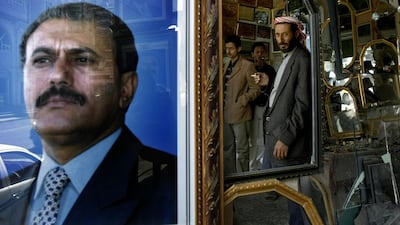When Ali Abdullah Saleh, ex-president of Yemen finished addressing his party's 35th anniversary rally in August, it was clear there had been a shift.
The former president, who likened governing Yemen to dancing on the heads of snakes, had made threats against his "enemies". He was referring not to the Arab coalition, with which his forces had been engaged in a bitter war, but to the Houthi rebels - his allies, whose forces had fought along Saleh's own against that same coalition.
This was vintage Saleh, whose ability to switch allies and play them off each other kept him in power for more than 30 years. The Houthis were once his bitter enemies until he joined forces with them because it was expedient and suited his goal of shoving aside the man to whom he had been forced to yield his presidency, his deputy Abdrabu Mansu Hadi.
But this time there was the possibility of something that might have made him unassailable: Saleh — never a peacemaker — was dangling the possibility of bringing the three-year civil war in Yemen to an end.
Rumours of possible negotiations with the internationally-recognised government of President Hadi soon began to circulate. The fact that Saleh had been left off a Saudi "Most Wanted" list — a list with 40 names on it — only made the rumours more credible. The streets erupted in violence between Houthis and Saleh loyalists.
In December, violence came to Saleh's door when he was killed in his car as he tried to escape the capital, Sanaa, which was - and for the time being, remains - in Houthi hands. His followers insist he was not fleeing and that the Houthis fabricated that detail to discredit him further.
________________
Read more
Yemeni tribal chiefs join Arab coalition to avenge Sheikhs
Houthi rebel documents show 'cracks in the ranks'
UN condemns Houthi ballistic missile against Saudi Arabia
________________
Since Saleh's death on December 4, all parties in the conflict have upped the pace. The Yemeni army has ramped up offensives on three fronts: in Al Bayda province in the south-east, in the north and on the Red Sea coast. The Houthis have launched more missiles at Saudi Arabia, most recently on December 19.
Until now, the Saudi-led coalition has held back out of concern for the civilian population who have already suffered so much : the worst outbreak of cholera in history, with more than 815,000 suspected cases and 2,156 deaths and 1.8 million children suffering from malnutrition. The humanitarian crisis is exacerbated by the Houthis who control Sanaa not paying tens of thousands of state employees for more than two years.
“We can destroy the Houthis and Saleh in a few days, we could destroy them (Houthis) but this would result in thousands of victims from our side, will result in funerals in every Saudi city and a high number of civilian Yemeni deaths and big losses,” Crown Prince Mohammed bin Salman said in an MBC interview in May.
When the Houthis fired missiles at Saudi Arabia, the coalition imposed a complete blockade on Yemen to prevent Iran from further supplying the rebels with weaponry in violation of a UN-sanctioned arms embargo. Shortly afterwards, Saudi Arabia lifted the blockade because it did not want to make the humanitarian disaster even worse in what was already the poorest Arab country.
But with Saleh out of the picture, the focus is now on forcing the Houthis to surrender. Since November, the Yemeni military has killed at least 80 Houthi officers, weakening the militia's presence and leadership. Over the next year, the Arab coalition is expected to ramp up the pressure even more on the Houthi rebels to bring them to the negotiating table.
Saleh's death on December 4 has driven his loyalists to the join Arab coalition, leaving the Houthis isolated with no one but their Iranian backers on their side. That alliance had kept them supplied with the sort of missile that Nikki Haley, the US ambassador to the United Nations, put on dramatic display at UN headquarters in New York. It had, she said, "all the hallmarks of previous attacks using Iranian-provided weapons."
In December, the Houthis claimed they had launched a missile at the UAE's Barakah nuclear power plant in the western region of Abu Dhabi. The UAE, which is part of the Saudi-led coalition, denied there had been any such attack.
The second missile launched at Riyadh was intercepted and found to bear the mark of Shahid Bagger Industries Loggo, an Iranian manufacturer. While they continue to fire missiles across the Arabian peninsula, the Houthis remain a danger to the Arab world.
Saleh's abandonment of the Houthis appeared to be a move towards negotiating peace. It is more likely that it was another twist in his machinations to take back the power he only ever relinquished under duress, for peace was not a language Saleh understood. But even this show of willingness to negotiate could have brought the war to an end. Now that he is gone, there is no need to wait for him.
It is ironic that in his last manoeuvring, Saleh might have achieved an end to the war for which he carried much blame.

